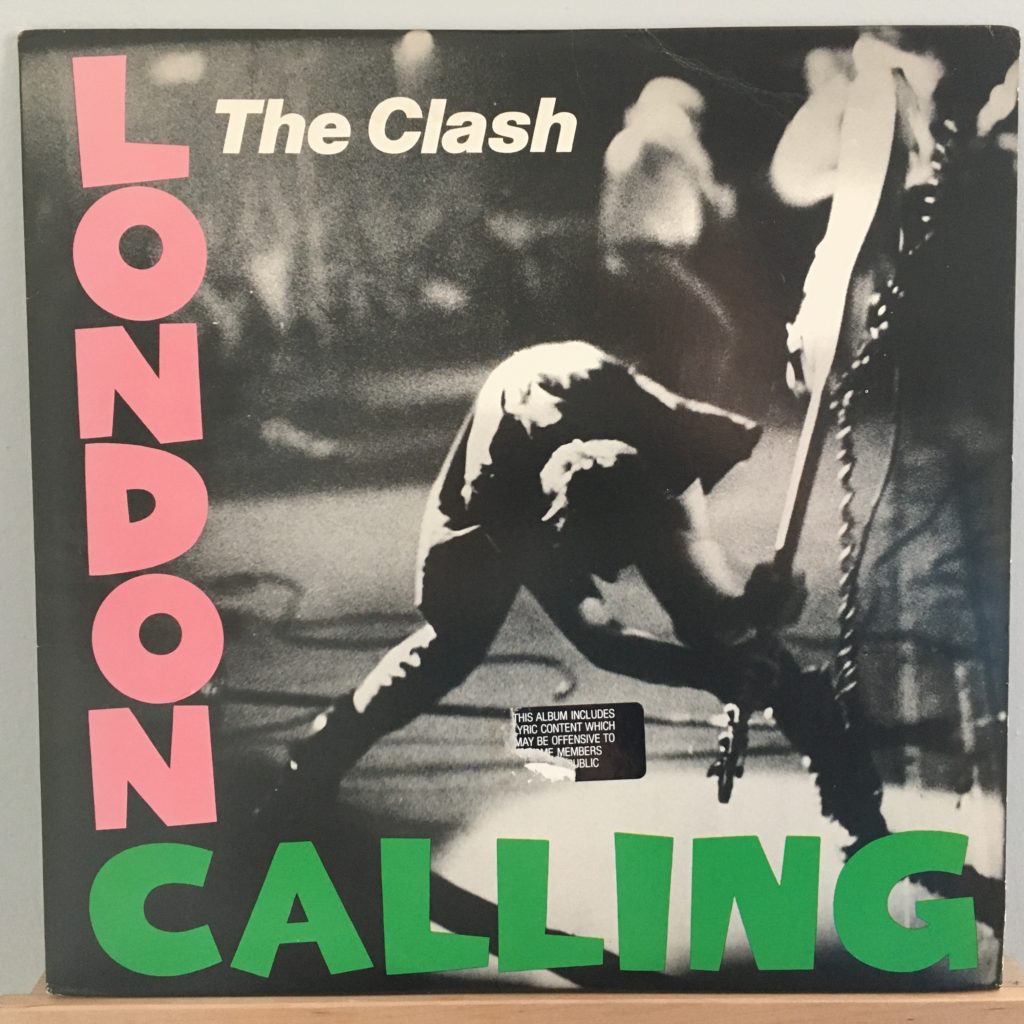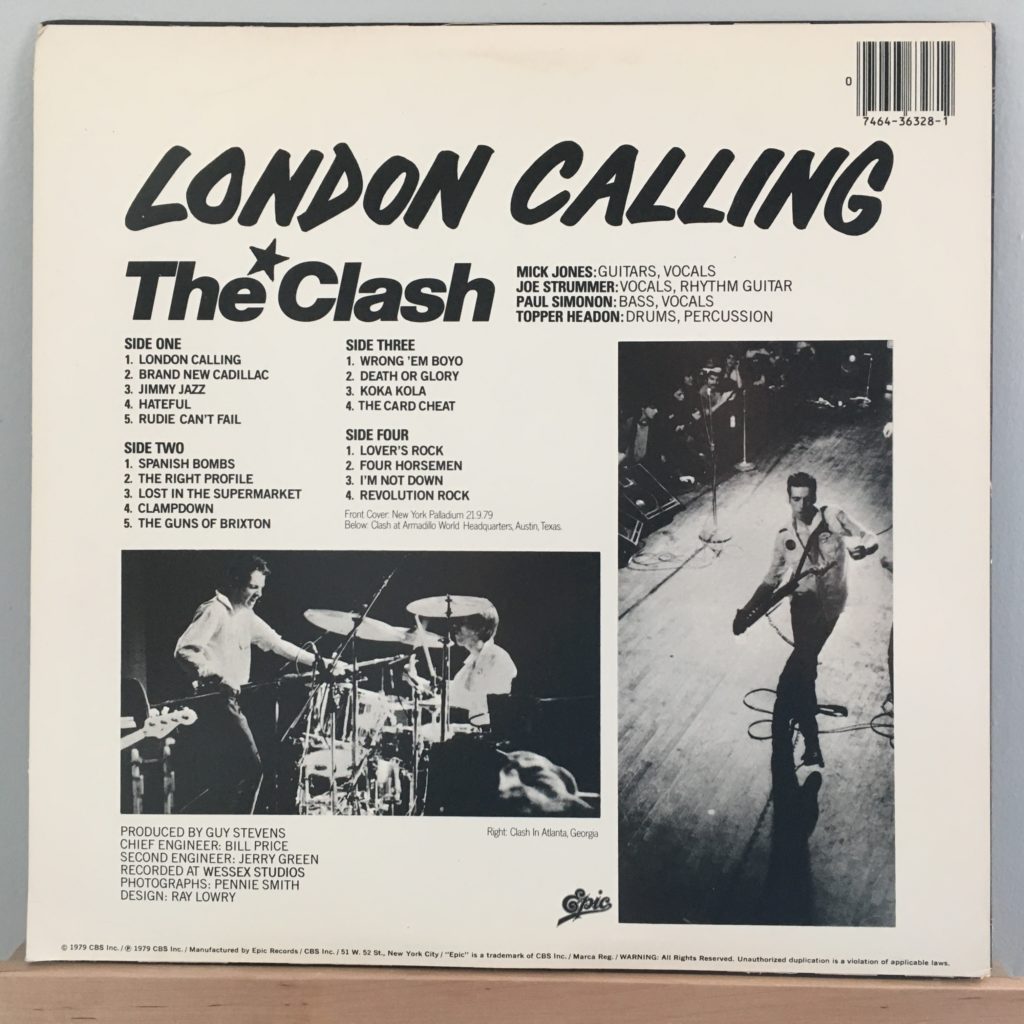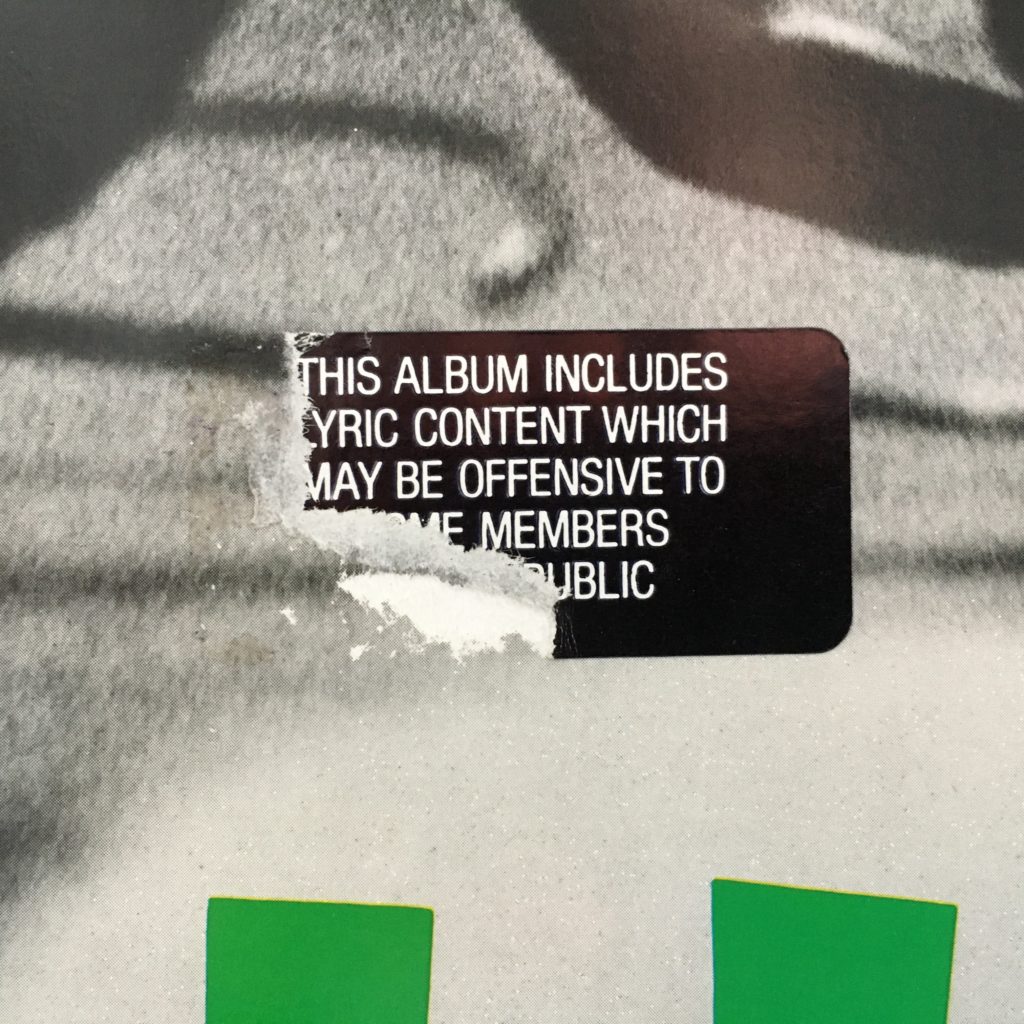I remember exactly where I was the first time I heard London Calling.
Then, as now, I messed around with photography. Sometimes I do all right. There were periods when I was very avid, if not particularly adept, and I spent many hours in the darkrooms processing and printing my own pictures, nearly all black and white, as well as those slides.

Syracuse University had a great facility for photography called Community Darkroom, in the Watson Hall complex. You paid a flat fee for a semester and could use the facilities as much as you wanted. Black and white chemistry was included, I believe. However, that flat fee wasn’t no fee — maybe it was $35/semester around 1980, but that’s just a memory guess — and that would make it about half a week’s pay at the time. Somehow I got a deal with UUTV, the university’s closed-circuit television station, to develop the Ektachrome slides they needed for various things like title cards and interstitials. Ektachrome used a process called E-6, the only color process that could really be done by hand with any reliability and without extreme care for temperature. So, I could process color slides right there in the Community Darkroom, and in exchange for doing that for the TV “station,” they paid my darkroom fees. And the best time to do this was late at night; at the ends of semesters, the darkrooms would be open all night, which suited me just fine as I had no regard for my body or sleep.
In addition to a TV station that I never really saw (it only came through certain connected televisions, mostly in dorm lounges), SU had two radio stations. One of them was the amazing WAER, which at that time was everything a college radio station could be and more — wide-ranging, free-spirited, and yet quite professionally run. It covered music, sports, and had great talk shows, and unlike some college stations I came to know later, it was never a chore to listen to. Like the student newspaper I worked on (The Daily Orange), WAER took itself very seriously.
Unlike the newspaper, however, WAER was not truly independent of the school, and at some point the faculty adviser, a huge jazz fan, decided that the only real way for students to get a foothold in the industry was to have experience programming like a real station, and converted it entirely to jazz. Because, you know, the jazz radio craze. So instead of developing their own public affairs shows, their own sports talk shows, their own news programming, now students would learn how to play a jazz record and flip the switch for NPR programs.
But back then, in the fall of 1979, WAER was cutting edge. It was also the station that was always on at the darkrooms. And one night, when I was working late in the darkrooms on something that probably had nothing to do with my classwork at all, they announced that there was a brand new album by The Clash (it may not have been officially released in the US yet), which meant virtually nothing to me, and that they were going to play it in its entirety.
Here’s where I was in the fall of 1979, my sophomore year: deeply into The Beatles, Jefferson Airplane, Country Joe and the Fish, and a variety of British Invasion acts. But a couple of Ramones records had also snuck into my consciousness, and while I didn’t have anything to say to the punk movement, to the extent I was even aware of it, I understood at least The Ramones version of it. And to the extent I had heard of The Clash, I knew they were a punk group, but I’m fairly sure I didn’t recognize any of their prior songs.

So, the radio starts in with that opening track, “London Calling,” and I am electrified. I cannot believe how good this is. I cannot think of anything that is this evocative, exciting, rhythmic — I’ve never experienced another song where I have felt more connected to what the singer is trying to put across. I have exactly zero to do with London, with punk culture, with British politics. I have exactly nothing to do with that feeling of hopelessness, frustration and angry despair. And yet, listening to “London Calling,” I am 100 percent there. The song transports me to something I was never part of, in a way that I think almost nothing else does (except, except quite a number of other Clash songs). If this is punk, sign me up. And forever, those opening notes will bring me back to the feeling of a late night in a quiet darkroom, bathed in amber light and awash in hypo fumes.
And they just kept on playing the album, and every song was not just great, but fucking great. It was transformative. I had never heard anything with this kind of energy, this kind of inventiveness, and yet this cohesiveness (let’s leave The Beatles out of this discussion). Each song a surprise, and the right kind of surprise.
In the normal course of things, I would have run right out and picked up that album at my earliest convenience. But there wasn’t a normal course of things in the following weeks. I got super sick, developing pneumonia, and had to take a whole bunch of incompletes. I came back for the spring semester, arriving on campus to find that our request to move had been approved, but we were never told . . . so we returned to our dorm room, only to find all our possessions had been moved into the dorm library. And, this not being the age of helicopter parenting, whoever had dropped us off had done just that . . . dropped us off, and headed back home. So we had no way to move our things from Dorm A to Dorm B. So that was great. And disorienting. Once over that, and trying to catch up on my school work, I really didn’t give that Clash album much more thought, probably not until that summer, when I ran across “London Calling” in, of all places, the Onondaga County Public Library. The old Carnegie library on Montgomery Street, with the iron stacks and translucent floors. A place of magic. And there I borrowed that record, which seemed never to have been played, and put it on good quality tape. And from that point for quite a few years forward, that was good enough — I wasn’t going to pay full price for a new copy (double album, remember), and I didn’t see it in the used bins or I’m sure I’d have snagged a copy. So, for years, that would do.
Eventually, I did buy a reissue of “London Calling,” in the mid-to-late ’80s. By then, Fucking Tipper Gore (see Alice Donut) had bullied the record companies into placing warning stickers on albums so that parents could police what their children were listening to without having to actually listen and judge for themselves. And by the time I bought my copy, the cover (not the outer plastic, mind you, but the cover itself) had been defaced with a sticker that warned “THIS ALBUM CONTAINS LYRIC CONTENT WHICH MAY BE OFFENSIVE TO SOME MEMBERS OF THE PUBLIC.” What was offensive on this album, I couldn’t say, but I was a fucking adult and offended that something I was buying of my own free will had to be tainted by this McCarthyesque poison. So I tried to get the sticker off . . . and off it would not come. Because, you know, you have to warn people forever, even after they’ve made up their minds to buy something, that it could be bad for them.

Sorry, this still makes me livid. So, my copy is permanently defaced, and lightly played as I soon procured a CD as well.
There hasn’t been a time of my life since when I wouldn’t listen to “London Calling,” and have to say that, as much as I want my kids for find their own way and have their own likes and dislikes, I’m pleased that at least one of my kids shares a deep appreciation for the utter brilliance of this album.

Take the record out of the sleeve and apply some heat from a blow dryer ( on low) and the label should come up sans damage to jacket.
Unfortunately the damage was done decades ago.